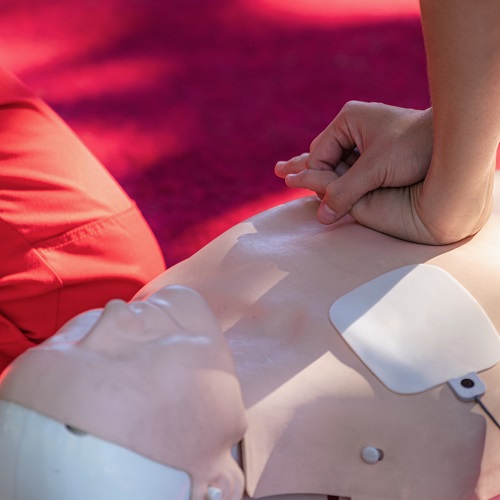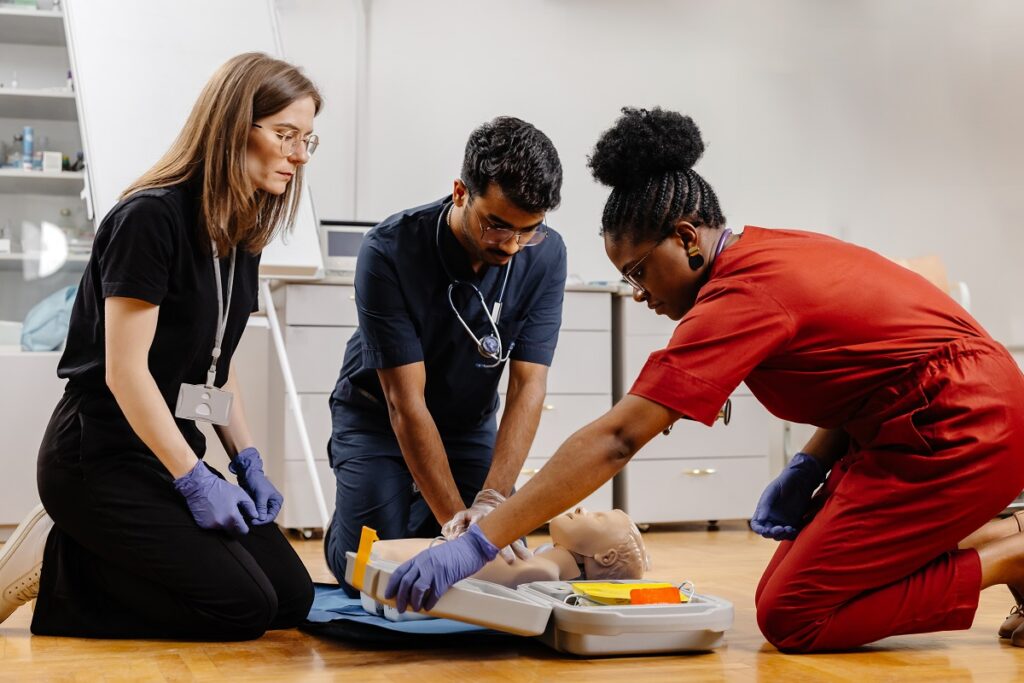Many careers today require lifesaving skills, and CPR certification jobs are in high demand across healthcare, education, public safety, and even corporate environments. Whether you’re entering nursing, teaching, childcare, or fitness, employers increasingly look for candidates trained in CPR.
According to the American Red Cross, CPR training prepares professionals to respond effectively during sudden cardiac arrest and other emergencies. For anyone considering jobs that need CPR certification, having this credential not only protects lives but also strengthens employability.
This guide explores the top cpr careers, industries with jobs that require CPR certification, and the benefits of adding CPR to your skill set.

Key Takeaways
- CPR certification jobs are common in healthcare, education, fitness, and public safety.
- Many employers require CPR training as a legal or workplace safety standard.
- Jobs that need CPR certification range from nurses and EMTs to teachers, coaches, and security staff.
- CPR training is quick—most courses take just a few hours—and certification lasts two years.
Why CPR Certification Matters in the Workplace
CPR certification jobs exist across multiple industries because emergencies can happen anywhere. Employers require CPR-trained staff to ensure safety and meet compliance standards.
- Legal requirements: OSHA states that when medical facilities are not nearby, employees must be trained in CPR and first aid.
- Healthcare compliance: Nurses, doctors, and EMTs must maintain active certification as part of their professional standards.
- Beyond healthcare: Teachers, coaches, lifeguards, fitness trainers, and security staff are common jobs that need CPR certification.
In short, jobs that require CPR certification are not optional—they are mandated in many fields and give candidates a hiring advantage.
Top CPR Certification Jobs in Healthcare
Most cpr certification jobs are in healthcare, where CPR is a mandatory skill. These roles require certification for patient safety and compliance with hospital standards, as highlighted by the U.S. Bureau Of Labor Statistics.
- Nurses – CPR is required for all nursing positions, from hospitals to long-term care facilities.
- Doctors – Physicians must maintain CPR certification as part of emergency care responsibilities.
- EMTs & Paramedics – CPR is a core skill for responding to cardiac arrest and trauma cases.
- Medical Assistants – Many clinics require CPR-certified staff to handle emergencies.
- Dental Professionals – Dentists and hygienists must have CPR training since patients can experience emergencies during procedures.
In healthcare, CPR is not optional. These cpr jobs demand valid certification.
CPR Certification Jobs Beyond Healthcare
Many jobs that require CPR certification are outside the hospital setting. These roles involve working with children, athletes, or the public, where emergencies are common.
- Teachers & School Staff – Many districts require CPR training to handle student emergencies.
- Coaches & Athletic Trainers – CPR is essential for sports-related injuries and sudden cardiac arrest.
- Childcare Providers & Babysitters – Most states require CPR certification for daycare staff and private caregivers.
- Lifeguards & Swim Instructors – CPR and AED use are mandatory for water safety roles.
- Firefighters & Police Officers – CPR is part of standard emergency response training.
These cpr certification jobs highlight that lifesaving skills are not limited to healthcare—they are required in education, recreation, and public safety.
CPR Certification for Corporate and Community Roles
Some industries outside healthcare and education also list CPR as a job requirement. These cpr certification jobs focus on workplace safety and public protection.
- Fitness Trainers & Gym Staff – CPR is required by most gyms and certifying bodies to respond to cardiac events during exercise.
- Construction & Industrial Workers – OSHA regulations often mandate CPR training on high-risk job sites.
- Security Guards – Many employers require CPR to ensure immediate response during medical incidents.
- Community Volunteers – Roles in community centers, nonprofits, and disaster relief programs often require CPR certification.
These cpr careers show that CPR training is a basic expectation in roles where public safety and emergency readiness are part of the job.
How to Get CPR Certified
Getting certified for cpr certification jobs is straightforward. Comfi-kare CPR offers professional CPR, AED, BLS, and First Aid training designed to meet employer requirements and prepare you for real emergencies. Courses typically take 3 to 4 hours to complete and include the hands-on practice most jobs require.
While organizations like the American Heart Association and the Red Cross set national standards for CPR training, Comfi-kare CPR delivers those same high-quality certifications locally—making it easier and more convenient to get certified or renewed.
Training options generally include:
- In-person courses – Full classroom instruction with hands-on practice.
- Blended learning – Online modules followed by a short in-person skills session.
- Online renewals – Some employers allow partial or full online renewal, but many still require an in-person skills check.
Certification validity: CPR certification is valid for two years. Renewal is required to stay compliant with workplace standards.
Comfi-kare CPR provides approved CPR certification and renewal courses, including CPR, AED, BLS, and First Aid training, making it easy for professionals to meet employer requirements.
Benefits of CPR Certification for Your Career
Holding CPR certification gives candidates an advantage in many fields. Employers often list it as a condition of employment, especially for jobs that require CPR certification in healthcare, education, and public safety.
Key benefits include:
- Increased employability – Certified candidates are prioritized for cpr jobs where safety is critical.
- Career flexibility – CPR applies across industries, opening opportunities in healthcare, childcare, fitness, and corporate safety roles.
- Professional compliance – For many cpr careers, certification is required by law or licensing boards.
- Confidence in emergencies – Being trained ensures you can act effectively during medical incidents at work.
In short, CPR certification is more than a credential—it is a job requirement that strengthens both career opportunities and workplace safety.
Conclusion
CPR certification jobs are available across healthcare, education, public safety, and even corporate industries. From nurses and EMTs to teachers, coaches, and security staff, many roles are considered jobs that require CPR certification as a condition of employment.
Getting certified is quick, valid for two years, and gives you an advantage when applying for cpr jobs.
If you’re ready to qualify for these opportunities, contact Comfi-kare CPR today. We provide CPR, AED, BLS, and First Aid training designed to meet employer standards and help you succeed in your career.
Frequently Asked Questions About CPR Certification Jobs
What can I do with my CPR certificate?
With a CPR certificate, you can qualify for many roles in healthcare, education, fitness, childcare, and public safety. Employers view certification as proof that you are trained to respond in emergencies, which makes you eligible for more cpr certification jobs.
Do jobs accept online CPR certification?
Some employers accept online CPR certification, but many require a blended format with an in-person skills check. Always confirm your employer’s requirements before enrolling in an online-only program.
What professions need CPR?
Professions that commonly require CPR include nurses, EMTs, doctors, teachers, coaches, childcare providers, firefighters, police officers, and fitness trainers.
How long does it take to get CPR certified?
Most CPR certification courses take 3 to 4 hours to complete, depending on whether the training is in-person or blended.
How long is CPR certification valid?
CPR certification is typically valid for two years. After that, renewal is required to stay compliant with workplace and licensing standards.


